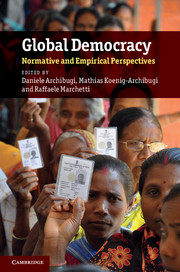Book contents
- Frontmatter
- Contents
- Figures
- Tables
- Notes on contributors
- Acknowledgements
- 1 Introduction
- 2 Models of global democracy
- 3 Citizens or stakeholders?
- 4 Is democratic legitimacy possible for international institutions?
- 5 Cosmopolitan democracy
- 6 Regional versus global democracy
- 7 Towards the metamorphosis of the United Nations
- 8 Flexible government for a globalized world
- 9 Global democracy and domestic analogies
- 10 Global democracy for a partially joined-up world
- 11 Civil society and global democracy
- 12 Global capitalism and global democracy
- 13 From peace between democracies to global democracy
- 14 The promise and perils of global democracy
- Index
- References
4 - Is democratic legitimacy possible for international institutions?
Published online by Cambridge University Press: 05 June 2012
- Frontmatter
- Contents
- Figures
- Tables
- Notes on contributors
- Acknowledgements
- 1 Introduction
- 2 Models of global democracy
- 3 Citizens or stakeholders?
- 4 Is democratic legitimacy possible for international institutions?
- 5 Cosmopolitan democracy
- 6 Regional versus global democracy
- 7 Towards the metamorphosis of the United Nations
- 8 Flexible government for a globalized world
- 9 Global democracy and domestic analogies
- 10 Global democracy for a partially joined-up world
- 11 Civil society and global democracy
- 12 Global capitalism and global democracy
- 13 From peace between democracies to global democracy
- 14 The promise and perils of global democracy
- Index
- References
Summary
Humanity as a whole currently faces a number of fundamental challenges that can only be dealt with on a global scale. Global warming and other environmental problems, severe poverty and the need for a fair system of international trade all call for international solutions that are achieved by means of collective decisions. But these solutions will require sacrifices on the part of all persons and there is likely to be a great deal of disagreement about the optimal solution and the fairest distribution of the burdens imposed by any solution. We need to have means for making collective decisions that all persons and the states of which they are members have good reason to regard as binding upon them.
An institution has legitimacy when it has a right to rule over a certain set of issues. The moral function of the legitimacy of decision-making processes is to confer morally binding force on the decisions of the institution within a moral community even for those who disagree with them and who must sacrifice. This morally binding force is achieved for a decision-making institution when its directives create content-independent and very weighty duties to obey the decision maker. There are three main conceptions of the grounds of legitimacy in modern political thought. One says that the legitimacy of an authoritative decision process depends on the quality of the outcomes of the decision process. A second sees the legitimacy of an authoritative process as based on the consent of the members. And the third sees legitimacy as grounded in liberal democratic processes of decision making. The latter two forms of legitimacy are particularly salient when there is considerable disagreement on how to assess the quality of outcomes.
- Type
- Chapter
- Information
- Global DemocracyNormative and Empirical Perspectives, pp. 69 - 95Publisher: Cambridge University PressPrint publication year: 2011
References
- 8
- Cited by

